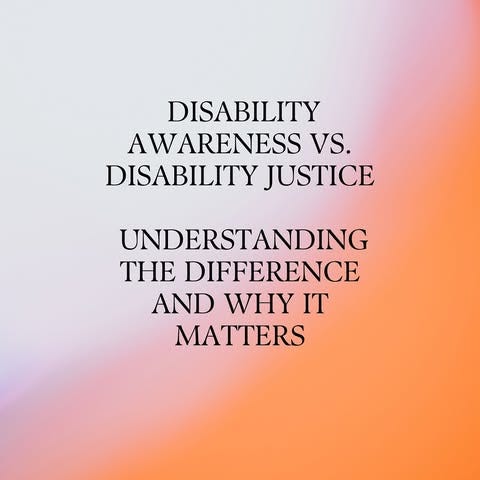Crip Doula Notes
A series introduction
What is a crip doula?
A crip doula is a person that guides those seeking support with navigating their disabilities. This offering is made based on observations that I’ve made against the backdrop of a global pandemic. As more people continue to become unnecessarily disabled, debilitated, and radicalized by COVID-19, it is imperative that they are invited into exploring their newly politicized disabled identities. Integral to identifying as politically disabled requires challenging ableist conditioning that we’re all subject to, unpacking internalized ableism, and building cross-disability solidarity to counteract lateral ableism. As a crip doula, I encourage people to create care plans for emergencies, support with self-advocacy in the face of eugenicist practitioners, and sharpening discernment around harm stemming from ableism within interpersonal relationships
About me:
I am a Black mad hottie currently holding the line against eugenics and COVID denialism, organizing with my local mask bloc. Having over a decade of organizing experience and about four years of informal crip doula support, I believe in supporting the self-determination and autonomy of disabled people. After participating and facilitating a peer support space with disabled folks over the past four years, I have witnessed the gift of peer support. As a disability justice trainer, I encourage people to consider disability more rigorously as we continue to organize towards a more accessible future. Being an agender, solo polyam, demibabe, I have spent a lot of time thinking about how our access to care is limited by the type of relationships we have (see the excerpt from the linked IG post below made in collaboration with Riz).
Racial identity and financial privilege often dictate access to care and resources:
Racialized disabled people face heightened discrimination, less access to healthcare, and systemic neglect.
Economic privilege allows some people to access private care, afford co-pays, mobility aids, and accessible transportation options that are unavailable to others.
Lack of collective support structures means marginalized communities often face isolation.
What I’ve been doing:
Facilitating workshops on disability justice, specializing in Blackness and disability. Hire me!
Organizing:
With my local mask bloc
With an autonomous group challenging mask bans in the state of New York.
Strategizing with @solidaritylaboratory around pandemic justice organizing efforts that challenge liberalism, by combining anarchism and disability justice.
Shifting organizing culture:
Challenging notions of saviourism and martyrdom that come with ableist organizing culture.
Encouraging collective access, transparent communication around capacity, and non-hierarchical structures and processes.
Supporting survivors: Helping survivors of abuse (particularly from within organizing spaces) reclaim their agency and develop courage to share their experiences.
Whether this is 1:1 or in public online spaces, I support people in real time on how to identify abuse tactics like DARVO and how to analyze matrices of power which inform patterns of harm.
How I’ve been showing up:
My values rooted in Black autonomy anchor my survivor-centered and abolitionist politic, which frame how I embody disability justice and resist COVID denialism.
The work that I do makes space for other Black disabled community members. Many folks have been struggling to survive, and, unfortunately, few of us have the community support needed to survive and thrive. Focusing on the most marginalized people in my community aims to build capacity for other Black disabled radicals to exercise their agency, conspiring towards Black mad liberation.
As a crip, grief, and death doula, a large portion of my work consists of providing emotional support for disabled community members and survivors. I am not a licensed practitioner, nor do I need to be in order to do what I do. I don’t need anything from the state to acknowledge my skills.
What to expect from this series:
Patterns and dynamics that I observe as it relates to organizing.
Reflection questions that encourage our growth and roles among these shifting landscapes.
I want those who engage with my work to consider:
What are your values?
How do you embody them?
Have you spent time acknowledging your contradictions?
What do your relationships look like?
What feels missing?
Where do you feel most affirmed?
We will be entering uncharted territories for the rest of our lives.
It’s going to be scary, but it takes work to build affirming spaces and relationships.
People want this labor to already be done for them, but under these conditions? Look around! They don’t exist because we need to build them.
Let’s create territories of resistance together.
If we want to challenge fascism and eugenics, we need to build networks rooted in community care. The state is not interested in, nor capable of supporting us. The sooner that becomes realized, the more expansive our radical potential becomes.
Hang in there, we’ll find each other 🌱



